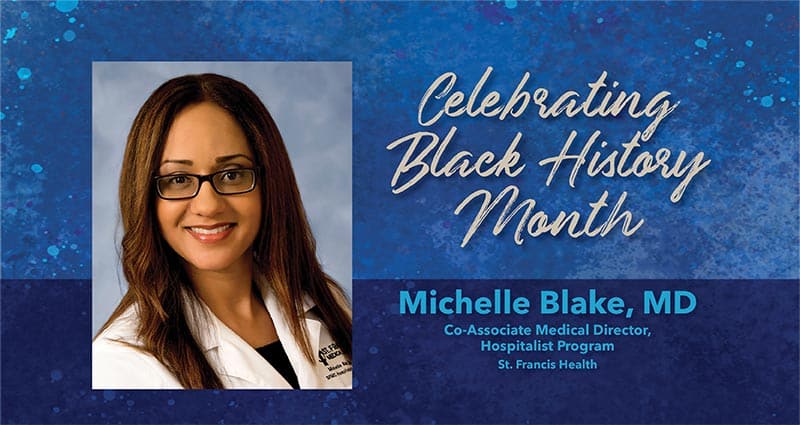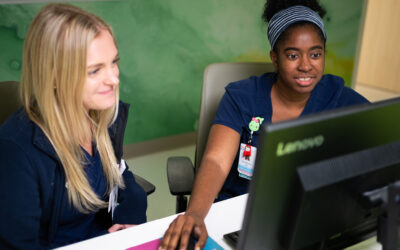Surviving an extremely rare brain tumor as an undergraduate inspired Michelle L. Blake, MD, to become a doctor.
Now Dr. Blake serves as co-associate medical director of the hospitalist program at St. Francis Medical Center. She manages the day-to-day operations and daily physician schedule for the hospitalist program. She’s also recently become associate program director for the new Internal Medicine Residency Program at St. Francis. Dr. Blake has been part of our St. Francis Health ministry for more than eight years.
Health Scare Leads to Medical Career Path
Dr. Blake played collegiate soccer in Oklahoma, and she began experiencing double vision during a game.
“My coach took me out and said ‘Blake, what are you doing? WHAT ARE YOU DOING?!? Your parents are here!’” Dr. Blake remembers. “I replied, ‘Coach, there are two balls and like 40 players on the field. I don’t know what’s going on.’”
She continued playing that game after refreshing her contacts, but she was eventually diagnosed with a rare brain tumor, sat out the rest of the season, traveled home to Canada and successfully underwent major brain surgery.
“This drastically changed my previous visioned trajectory and inspired me to become a doctor,” Dr. Blake says. “I placed all of my trust in God and the physicians who treated me. I am honored to give back to the medical field and that others can place that same trust in me. I know this doctor-patient relationship to be sacred and hold principle that standard quality healthcare is as inalienable a right of humanity as any other.”
Career Influence
Dr. Blake credits her parents as having influenced her on her journey to medicine.
“My mom is hands down the strongest woman that I know. She inspires me daily, and if I can even be half the person that she is, I will be content,” she says. “My dad is second to none. He sees in me things that I do not see in myself, and he is my biggest fan. I am thankful for their relentless work ethic, selflessness, lifelong support and dedication to making me the best version of myself.”
Her soccer college coach, Jimmy Hampton, was also a major influence. “No coach, guidance counselor, teacher nor professor prepared me better for medical school, residency and fellowship training,” Dr. Blake says.
Throughout her career Dr. Blake has overcome challenges.
“I am a work in progress, and I still at times find it quite difficult to remain calm and composed when another is blatantly racist, misogynistic or both,” she says. When these unfortunate scenarios happen Dr. Blake prays for God’s grace and recites the words of Dr. Martin Luther King Jr. in her head:
“I have decided to stick with love. Hate is too great a burden to bear,” and “Love is the only force capable of transforming an enemy into a friend.”
Building Community
This year in recognition of Black History Month, our health system is reflecting on The King Center’s 2023 theme to celebrate Dr. King’s work and life: It Starts with Me: Cultivating a Beloved Community Mindset.
Dr. Blake makes a conscious effort to listen to her colleagues to maintain a positive working environment.
“After each patient encounter, I ask my patients and their family members at bedside if they have any questions and/or concerns,” Dr. Blake says. “Listening is key to bring about positivity and change.”
Cultivating community through giving is also important to Dr. Blake, and she supports local organizations that dedicate themselves to helping the Northeast Louisiana community including the Ouachita Council on Aging, The Boys and Girls Club of North Louisiana, sober living homes and survivors of domestic violence.
“It is my absolute pleasure to help those in need, and I am blessed to be able to do so,” Dr. Blake says. “I have a particular interest in supporting children. I originally thought that I was meant to be a pediatrician, though it was not my calling. May God bless all pediatricians.”
Serving at St. Francis Health
Providing high-quality healthcare in a medically underserved region is Dr. Blake’s passion and God’s calling for her.
“It has brought me significant meaning and reward. My connection, commitment, love for the practice of medicine, and for my patients stems from my unique experience,” she says. “Though I was terrified at a young age with my diagnosis, I learned a lesson that takes a lifetime for many.”
Health Equity
Many factors determine a person’s overall health such as access to transportation, healthy foods and safe living conditions. Screening for and addressing these social determinants of health is standard of care across our health system and part of our focus on health equity.
“I do not believe that access to healthcare should be based on one’s socioeconomic status, income or ability to afford insurance,” Dr. Blake says. “Inadequate access to quality healthcare remains a persistent concern for minority populations and low income individuals residing in the United States. We are most definitely making progress, though we still have a long way to go.”
Our DEI Commitment
Our ministry’s commitment to diversity, equity and inclusion supports culturally competent care education for our team members all year long, including during Black History Month each February.




